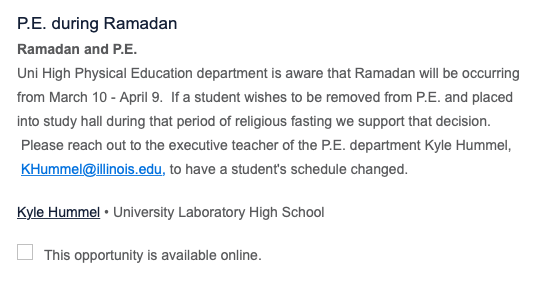Uni Working to Increase Diversity and Equity
Uni High Administrators are working hard to create more diversity and equity in our school through new staff positions and outreach.
In a school of 315 students, only 18 identify as African-American and 24 as Hispanic, according to data from the Uni Administration. This is only 5.7% and 7.6% of the school’s population respectively and does not reflect Champaign Country’s racial makeup, which is about 13.8% Black or African American and 6.3% Hispanic or Latino, according to the Census Bureau.
Interim Head Elizabeth Majerus views diversity and inclusion as “ethically important for a public school to represent the community” and believes that school is a better place when it is less homogenous.
Majerus outlined several ways that Uni is trying to create more inclusion both through admissions and student’s experiences while at Uni. One important part of this initiative has been appointing Dr. Valerie O’Brien as the Coordinator for Equity and Public Engagement.
So far, O’Brien has created a school lunch program for all Uni students who are interested. Families can opt in to the program and pay for a 2 or 5 days a week option. Students who qualify for a free and reduced lunch will have the cost covered by the National School Lunch Program and donations. Hendrick House will provide to-go lunches for students to pick up in the kitchen.
O’Brien calls the lunch program an important form of “social and physical support” for students who need it. Importantly, this addition means that any student who applies to Uni and gets free lunch from their middle school won’t need to worry about whether or not they will have meals when they come to Uni. In this way, students who can’t afford to buy or bring lunch every day will still have the opportunity to thrive at Uni.
She has also created ties with the community and outreach and started a student advisory group to work on combating the issue of lack of diversity, which Majerus encourages students to join.
Another important change that Majerus has made is the change to the admission process so that it doesn’t require “more privilege” to successfully fill out the application.
The SSAT is no longer required to apply to Uni, a test that Majerus says “represented an obstacle for students of less privileged backgrounds” due to the length, cost, and location. She also notes that some standardized tests measure “student’s educational privilege as much as their innate promise or potential.” She hopes to find a better test in the future but thinks that removing the SSAT is a step in the right direction.
Admissions Coordinator Carol Lombardi, Majerus, and O’Brien all noted how important it is to let people know about Uni. Uni has been hosting virtual events due to COVID-19 but will host events at places other than Uni when the pandemic is over to increase families’ ability to attend these information sessions.
Lombardi discussed the role that race and ethnicity play in admissions. The admissions committee tries to create a balanced class, and although the committee only admits qualified applicants, they do try and create a diverse class in terms of race, gender, and interests.
Lombardi also shared the percentage of students of certain ethnicities who get in out of those who apply. In the last 11 years, 37.5% of African American students who applied got on, compared to 34.1% of total students. Hispanic students got in 38.9% of the time while students who identified as two or more ethnicities got in 42.9% of the time.
Lombardi also noted that the variance in numbers may not necessarily be “significant or meaningful” because the numbers are “very small, maybe 3 or 4 each year” so “a difference of one more or less would be reflected as quite a large percentage.”

